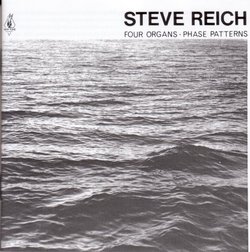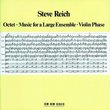| All Artists: Steve Reich, Arthur Murphy, Jon Gibson, Philip Glass, Steve Chambers Title: Steve Reich: Four Organs; Phase Patterns Members Wishing: 4 Total Copies: 0 Label: Dunya Original Release Date: 1/1/2003 Re-Release Date: 9/30/2003 Genres: Dance & Electronic, Jazz, Special Interest, Rock, Classical Styles: Techno, Avant Garde & Free Jazz, Experimental Music, Chamber Music, Historical Periods, Modern, 20th, & 21st Century, Symphonies Number of Discs: 1 SwapaCD Credits: 1 UPC: 045775802121 |
Search - Steve Reich, Arthur Murphy, Jon Gibson :: Steve Reich: Four Organs; Phase Patterns
 | Steve Reich, Arthur Murphy, Jon Gibson Steve Reich: Four Organs; Phase Patterns Genres: Dance & Electronic, Jazz, Special Interest, Rock, Classical
|
Larger Image |
CD DetailsSimilar CDs |
CD ReviewsThis is the GOOD version Mike Willmot | ON, Canada | 12/16/2005 (5 out of 5 stars) "There's been a lot of confusion about the piece "Four Organs." 'What's the confusion' you may ask yourself. Well, the truth is that a lot of people hate this piece when, in fact, it's fudging unbelievably amazing. But I can understand those who don't like the piece; there's good reason to when you've heard any version of it besides this one. I can't fully back up that statement but lemme tells ya, I recently got the box set of steve reich's works. God, was I disappointed. Four Organs suuuuuuucked!!! My ears were in pain. It sounded like there were three very quiet organs and one ridiculously loud one. Seriously though, this piece is like making love to woman and it has to be good the first time through or you could be scarred. I honestly feel bad for anyone who heard the 'bang on a can' one first. Buy this album, or if you're a dirty thief, download it. The main point is don't settle for sh#%." Hypnotic directions | Space Time Foam | 10/21/2005 (4 out of 5 stars) "This is early minimalism, a hard listen for those not used to the genre but for those who are initiated, it is a classic. The recording is live (without audience reaction included) and has both Philip Glass and Steve Reich (one of the few times) together. Four Organs is an intense piece, the same phrase played by the musicians, repeatedly but slowly until all the resonant frequencies and harmonies become apparent. I've seen it performed live and while it may sound easy to play, it requires a lot of team work to perform. Phase Patterns is not quite as good, the key idea of the piece to have a music phrase go in and out of phase. It doesn't work as well but it still holds up. If you haven't heard any Reich, I would suggest Music for 18 Musicians as a starter. Once you've immersed yourself in the world of minimalism, then by all means pick this one up. This is minimalist music when it was challenging the avant-garde classical world (then mired in serialist music) in the same mannor as free jazz did for jazz and punk did for rock."
|

 Track Listings (2) - Disc #1
Track Listings (2) - Disc #1